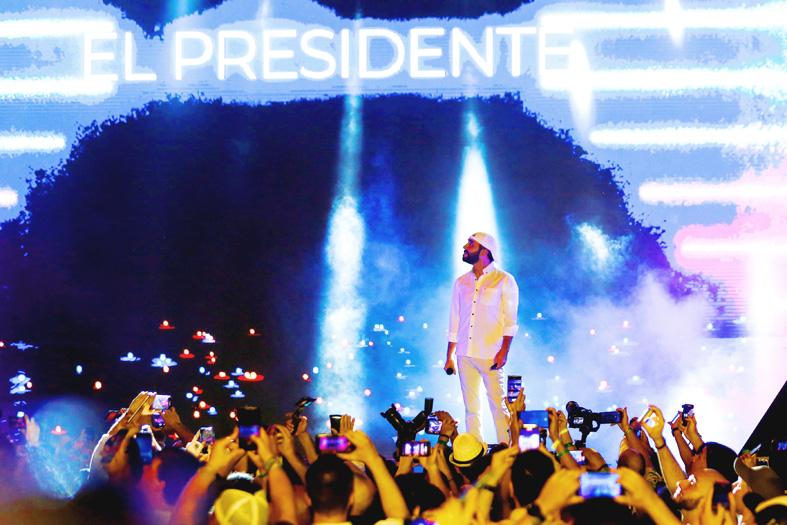El Salvador plans to build the world’s first “Bitcoin City,” funded initially by bitcoin-backed bonds, Salvadoran President Nayib Bukele said on Saturday, doubling down on his bet to harness the cryptocurrency to fuel investment in the Central American country.
Speaking at an event closing a week-long promotion of bitcoin in Mizata, El Salvador, Bukele said that the city planned in the eastern region of La Union would get geothermal power from a volcano and not levy any taxes except for value added tax (VAT).
“Invest here and make all the money you want,” Bukele said in English, dressed all in white and wearing a reversed baseball cap. “This is a fully ecological city that works and is energized by a volcano.”

Photo: Reuters
Half of the VAT levied would be used to fund the bonds issued to build the city, and the other half would pay for services such as garbage collection, Bukele said, estimating the public that needed infrastructure would cost around 300,000 bitcoins.
El Salvador in September became the first country in the world to adopt bitcoin as legal tender.
Although Bukele is a popular president, opinion polls show that Salvadorans are skeptical about his love of bitcoin, and its bumpy introduction has fueled protests against his administration.
Likening his plan to cities founded by Russian czar Alexander the Great, Bukele said that Bitcoin City would be circular, with an airport, residential and commercial areas, and feature a central plaza designed to look like a bitcoin symbol from the air.
“If you want bitcoin to spread over the world, we should build some Alexandrias,” said Bukele, a tech savvy 40-year-old who in September proclaimed himself “dictator” of El Salvador, in an apparent joke on Twitter.
El Salvador plans to issue the initial bonds next year, Bukele said.
Samson Mow (繆永權), chief strategy officer of blockchain technology provider Blockstream Corp, told the gathering that the first 10-year issue, known as the “volcano bond,” would be worth US$1 billion, backed by bitcoin and carrying a coupon of 6.5 percent.
Half of the sum would go to buying bitcoin on the market, he said, adding that other bonds would follow.
After a five-year lockup, El Salvador would start selling some of the bitcoin used to fund the bond to give investors an “additional coupon,” Mow said, adding that the value of the cryptocurrency would continue to rise robustly.
“This is going to make El Salvador the financial center of the world,” he said, adding that the bond would be issued on the “liquid network,” a bitcoin sidechain network.
To facilitate the process, the El Salvadoran government is working on a securities law, and the first license to operate an exchange would go to Bitfinex, Mow said.
Once 10 such bonds are issued, US$5 billion in bitcoin would be taken off the market for several years, Mow said.
“And if you get 10 more countries to do these bonds, that’s half of bitcoin’s market cap right there,” he said
The “game theory” on the bonds gave first issuer El Salvador an advantage, Mow said, adding: “If bitcoin at the five-year mark reaches US$1 million, which I think it will, they will sell bitcoin in two quarters and recoup that US$500 million.”

Intel Corp chief executive officer Lip-Bu Tan (陳立武) is expected to meet with Taiwanese suppliers next month in conjunction with the opening of the Computex Taipei trade show, supply chain sources said on Monday. The visit, the first for Tan to Taiwan since assuming his new post last month, would be aimed at enhancing Intel’s ties with suppliers in Taiwan as he attempts to help turn around the struggling US chipmaker, the sources said. Tan is to hold a banquet to celebrate Intel’s 40-year presence in Taiwan before Computex opens on May 20 and invite dozens of Taiwanese suppliers to exchange views

Application-specific integrated circuit designer Faraday Technology Corp (智原) yesterday said that although revenue this quarter would decline 30 percent from last quarter, it retained its full-year forecast of revenue growth of 100 percent. The company attributed the quarterly drop to a slowdown in customers’ production of chips using Faraday’s advanced packaging technology. The company is still confident about its revenue growth this year, given its strong “design-win” — or the projects it won to help customers design their chips, Faraday president Steve Wang (王國雍) told an online earnings conference. “The design-win this year is better than we expected. We believe we will win

Quanta Computer Inc (廣達) chairman Barry Lam (林百里) is expected to share his views about the artificial intelligence (AI) industry’s prospects during his speech at the company’s 37th anniversary ceremony, as AI servers have become a new growth engine for the equipment manufacturing service provider. Lam’s speech is much anticipated, as Quanta has risen as one of the world’s major AI server suppliers. The company reported a 30 percent year-on-year growth in consolidated revenue to NT$1.41 trillion (US$43.35 billion) last year, thanks to fast-growing demand for servers, especially those with AI capabilities. The company told investors in November last year that

Power supply and electronic components maker Delta Electronics Inc (台達電) yesterday said it plans to ship its new 1 megawatt charging systems for electric trucks and buses in the first half of next year at the earliest. The new charging piles, which deliver up to 1 megawatt of charging power, are designed for heavy-duty electric vehicles, and support a maximum current of 1,500 amperes and output of 1,250 volts, Delta said in a news release. “If everything goes smoothly, we could begin shipping those new charging systems as early as in the first half of next year,” a company official said. The new